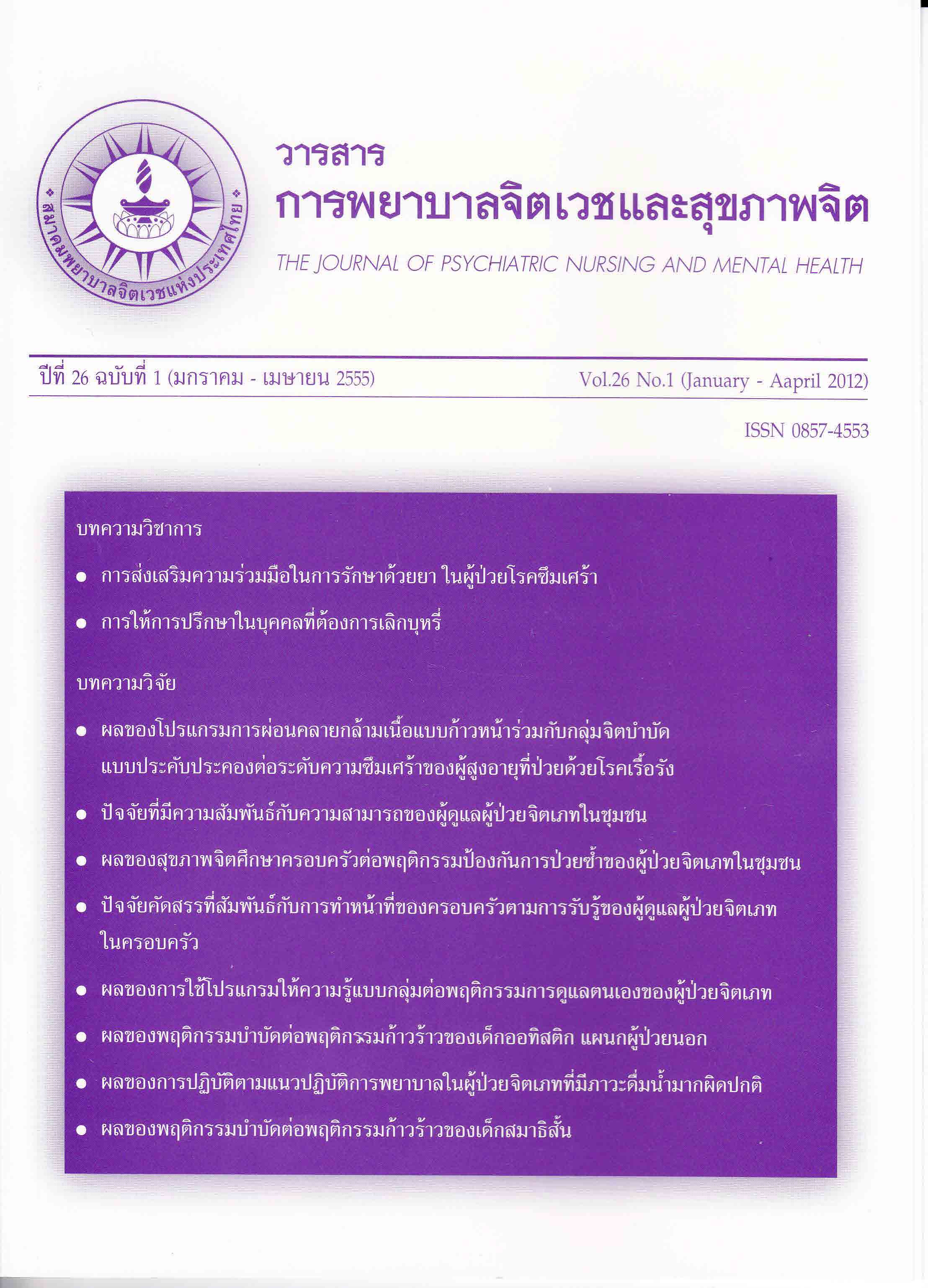ผลของการใช้โปรแกรมให้ความรู้แบบกลุ่มต่อพฤติกรรมการดูแลตนเองของผู้ป่วยจิตเภท
Main Article Content
บทคัดย่อ
บทคัดย่อ
การวิจัยกึ่งทดลองแบบสองกลุ่มวัดสองครั้งก่อนและหลังการทดลองเรื่องนี้ มีวัตถุประสงค์ คือ 1) เพื่อเปรียบเทียบพฤติกรรมการดูแลตนเองของ ผู้ป่วยจิตเภทก่อนและหลังได้รับโปรแกรมให้ความรู้แบบกลุ่ม 2) เพื่อเปรียบเทียบพฤติกรรมการดูแลตนเองของผู้ป่วยจิตเภทกลุ่มที่ได้รับโปรแกรมให้ความรู้แบบกลุ่มกับกลุ่มที่ได้รับการดูแลตามปกติ กลุ่มตัวอย่างคือ ผู้ป่วยจิตเภทที่มารับบริการที่คลินิกจิตเวช โรงพยาบาลราชบุรี ซึ่งมีคุณสมบัติตามเกณฑ์ จำนวน 40 คน และได้รับการจับคู่แล้วสุ่มเข้ากลุ่มทดลอง และกลุ่มควบคุมกลุ่มละ 20 คน กลุ่มทดลองได้รับการดูแลตามโปรแกรมให้ความรู้แบบกลุ่มที่ผู้วิจัยได้ประยุกต์ใช้แนวคิดการพัฒนากลุ่มของ Marram (1978) ร่วมกับโปรแกรมการสอนสุขภาพจิตแบบกลุ่มของ โชติพร พันธ์ุวัฒนาชัย (2547) ประกอบด้วยการดำเนินกลุ่ม 3 ครั้ง เพื่อพัฒนาความรู้และทักษะที่เกี่ยวข้องกับพฤติกรรมการดูแลตนเอง เครื่องมือที่ใช้ในการวิจัยคือ 1) โปรแกรมให้ความรู้แบบกลุ่ม 2) แบบวัดพฤติกรรมการดูแลตนเอง และ 3) แบบทดสอบความรู้เกี่ยวกับการดูแลตนเอง วิเคราะห์ข้อมูลโดยใช้คะแนนเฉลี่ย ส่วนเบี่ยงเบนมาตรฐาน และสถิติทดสอบค่าที
ผลการวิจัยพบว่า ภายหลังได้รับโปรแกรมให้ความรู้แบบกลุ่ม ผู้ป่วยจิตเภทมีค่าคะแนนเฉลี่ยของพฤติกรรมการดูแลตนเองสูงกว่าก่อนได้รับโปรแกรมอย่างมีนัยสำคัญทางสถิติที่ระดับ .05 (t = 28.71, P < .05) และสูงกว่าผู้ป่วยจิตเภทกลุ่มที่ได้รับการดูแลตามปกติอย่างมีนัยสำคัญทางสถิติ ที่ระดับ .05 (t = 33.84, P < .05) แสดงให้เห็นว่าเนื้อหาและกิจกรรมที่ใช้ดำเนินโปรแกรมให้ความรู้แบบกลุ่มทำให้ผู้ป่วยจิตเภทมีแรงจูงใจที่จะปรับเปลี่ยนหรือพัฒนาพฤติกรรมการดูแลตนเองให้มากขึ้น ซึ่งจะช่วยป้องกันการกลับเป็นซ้ำ
คำสำคัญ : ผู้ป่วยจิตเภท, โปรแกรมให้ความรู้แบบกลุ่ม, พฤติกรรมการดูแลตนเอง
Abstract
The purpose of this quasi – experimental research using the pretest – posttest design were : 1) to compare self–care behaviors of schizophrenic patients before and after receiving the group education program, and 2) to compare self–care behaviors of schizophrenic patients who received the group education program and those who received regular caring activities. Forty of schizophrenic patients receiving services in psychiatric clinic, Ratchaburi Hospital, who met the inclusion criteria, were matched pair and then randomly assigned to experimental group and control group, 20 subjects in each group. The experimental group receiving the group education program which researcher was applied based group process of Marram (1978) and the group education program of Chodtiporn Panwattanachai (2547) composed of 3 group activities to improve relevant knowledge and skills including self–care behaviors. Research instruments were : 1) the group education program, 2) the self-care behaviors scale, and 3) self-test about knowledge of self-care. Statistical techniques used for data analysis were mean, standard deviation and t-test.
The results revealed that after receiving the group education program, the mean score of Self-care behaviors of schizophrenic patients was significantly better than before, at p .05 level. (t = 28.71, P < .05) and better than those who received regular caring, at p .05 level. (t = 33.84, P < .05) It was also found that the program’ s content and activities involved in the group education program were motivation to change or develop better self-care behaviors, which may prevent relapses.
Keywords : schizophrenic patients, self–care, group education program
Article Details
บทความที่ได้รับการตีพิมพ์แล้ว เป็นลิขสิทธิ์ของสมาคมพยาบาลจิตเวชแห่งประเทศไทย


